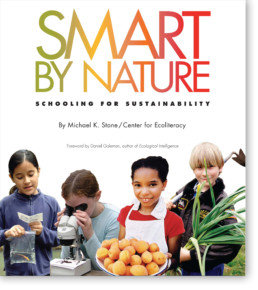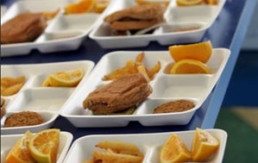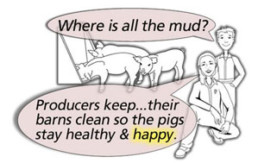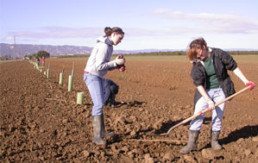Young people today face unprecedented challenges: climate change; loss of biodiversity; the end of cheap energy; environmental degradation; gross inequities in standards of living; an epidemic of obesity, diabetes, asthma, and other environmentally linked illness. Our book Smart by Nature provides information, inspiration, and support to K-12 educators, parents, and others who are helping prepare tomorrow’s leaders to understand the interconnectedness of human and natural systems.
Books

Winner of 2010Green Prize for SustainableLiterature in the Category of Educations
Smart By NatureSchooling for sustainability
Schooling for Sustainability is an initiative for the Center for Ecoliteracy written by Michael K. Stone and edited by Watershed Media. This book provides information, inspiration, and support to the vital movement of K-12 educators, parents, and others who are helping young people gain the knowledge, skills, and values essential to sustainable living.
Smart By NatureSchooling for sustainability
Schooling for Sustainability is an initiative for the Center for Ecoliteracy written by Michael K. Stone and edited by Watershed Media. This book provides information, inspiration, and support to the vital movement of K-12 educators, parents, and others who are helping young people gain the knowledge, skills, and values essential to sustainable living
Videos
Essays
HOW You Can Help
-
Organize.
Identify the people who share your concerns and interests, and build your efforts around them. Your allies could include students, PTA and PTO members, parents, teachers, the school nurse, board members, or local businesses
-
Envision.
Keep the end in mind by developing a vision statement or a working definition of what sustainability means to your school. Visualize the Smart by Nature graduate.
-
Take Stock.
Conduct sustainability and curriculum audits to set priorities. Review the environmental impact of the school’s policies and practices in order to set priorities and establish baselines to measure your success.
-
Plan.
Create a strategy and move from vision to action. The real world is the optimal learning environment. Make the campus a hands-on laboratory for addressing real issues around sustainability.
-
Reflect.
Close the feedback loop: monitor, evaluate, and celebrate progress. Nature is our teacher. Natural ecosystems and social systems maintain themselves, “learn,” and evolve through networks of feedback
Click here to print a complete list of actions you can take in your everyday life.
collaborators







